List of chancellors of Germany
The chancellor of Germany[1] is the political leader of Germany and the head of the federal government. The office holder is responsible for selecting all other members of the government and chairing cabinet meetings.[2]
- Top left: Otto von Bismarck became the first chancellor with the creation of the North German Confederation (1867) and later the German Empire (1871).
- Top right: Adolf Hitler was chancellor (from 1933) and later Führer of Nazi Germany.
- Bottom left: In 1949, Konrad Adenauer became the first chancellor of West Germany after World War II.
- Bottom right: Helmut Kohl held the office during the period of German reunification.
The office was created in the North German Confederation in 1867,[3] when Otto von Bismarck became the first chancellor. With the unification of Germany and establishment of the German Empire in 1871, the Confederation evolved into a German nation-state and its leader became known as the chancellor of Germany.[4] Originally, the chancellor was only responsible to the emperor. This changed with the constitutional reform in 1918, when the Parliament was given the right to dismiss the Chancellor. Under the 1919 Weimar Constitution the chancellors were appointed by the directly elected President, but were responsible to Parliament.[5] The constitution was set aside during the 1933–1945 Nazi dictatorship. During Allied occupation, no independent German government and no chancellor existed; and the office was not reconstituted in East Germany. The 1949 Basic Law made the chancellor the most important office in West Germany, while diminishing the role of the president.[1]
North German Confederation, Bundeskanzler (1867–1871)
The North German Confederation came into existence after the falling apart of the German Confederation, itself caused by Prussian victory in the Austro-Prussian War of 1866. The chancellor was appointed by the Prussian king.[3]
Political party
| Portrait | Name (Birth–Death) |
Term of office | Party | |||
|---|---|---|---|---|---|---|
| Took office | Left office | Duration | ||||
 |
Count Otto von Bismarck (1815–1898) |
1 July 1867 |
21 March 1871 |
3 years, 263 days | Non-partisan | |
German Empire, Reichskanzler (1871–1918)
The German Empire was born out of the North German Federation as result of the Franco-Prussian War. The newly created Emperor named the Chancellor to serve at his pleasure.[4]
Political parties
| Portrait | Name (Birth–Death) |
Term of office | Party | Cabinet | |||
|---|---|---|---|---|---|---|---|
| Took office | Left office | Duration | |||||
 |
Prince Otto von Bismarck (1815–1898) |
21 March 1871 |
20 March 1890 |
18 years, 364 days | Non-partisan | Bismarck | |
 |
Count Leo von Caprivi (1831–1899) |
20 March 1890 |
26 October 1894 |
4 years, 220 days | Non-partisan | Caprivi | |
_773.jpg.webp) |
Prince Chlodwig zu Hohenlohe-Schillingsfürst (1819–1901) |
29 October 1894 |
17 October 1900 |
5 years, 353 days | Non-partisan | Hohenlohe-Schillingsfürst | |
.jpg.webp) |
Prince Bernhard von Bülow (1849–1929) |
17 October 1900 |
14 July 1909 |
8 years, 270 days | Non-partisan | Bülow | |
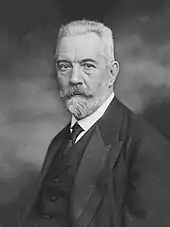 |
Theobald von Bethmann-Hollweg (1856–1921) |
14 July 1909 |
13 July 1917 |
7 years, 364 days | Non-partisan | Bethmann-Hollweg | |
 |
Georg Michaelis (1857–1936) |
14 July 1917 |
1 November 1917 |
110 days | Non-partisan | Michaelis | |
 |
Count Georg von Hertling (1843–1919) |
1 November 1917 |
30 September 1918 |
333 days | Centre Party | Hertling | |
 |
Prince Max von Baden (1867–1929) |
3 October 1918 |
9 November 1918 |
37 days | Non-partisan | Baden | |
Revolutionary period, Reichskanzler (1918–1919)
On 9 November 1918, Chancellor Max von Baden handed over his office to Friedrich Ebert. Ebert continued to serve as head of government during the three months between the end of the German Empire in November 1918 and the first gathering of the National Assembly in February 1919 as Chairman of the Council of the People's Deputies, until 29 December 1918 together with USPD Leader Hugo Haase.[6]
Political party
| Portrait | Name (Birth–Death) |
Term of office | Party | Cabinet | |||
|---|---|---|---|---|---|---|---|
| Took office | Left office | Duration | |||||
 |
Friedrich Ebert (1871–1925) (Reichskanzler and Vorsitz des Rates der Volksbeauftragten) |
9 November 1918 |
13 February 1919 |
96 days | Social Democratic Party of Germany | Council of the People's Deputies | |
Weimar Republic, Reichskanzler (1919–1933)
The Weimar Constitution of 1919 set the framework for the Weimar Republic. The Chancellors were often dependent on support from the President.[1][5]
Political parties
| Portrait | Name (Birth–Death) |
Term of office | Party | Cabinet | Reichstag | |||
|---|---|---|---|---|---|---|---|---|
| Took office | Left office | Duration | ||||||
 |
Philipp Scheidemann (1865–1939) (Reichsministerpräsident)[lower-alpha 1] |
13 February 1919 |
20 June 1919 |
127 days | Social Democratic Party of Germany | Scheidemann | Nat.Ass. (1919) | |
 |
Gustav Bauer (1870–1944) (Reichsministerpräsident; from 14 August 1919 Reichskanzler)[lower-alpha 1] |
21 June 1919 |
26 March 1920 |
279 days | Social Democratic Party of Germany | Bauer | ||
 |
Hermann Müller (1876–1931) |
27 March 1920 |
21 June 1920 |
86 days | Social Democratic Party of Germany | Müller I | ||
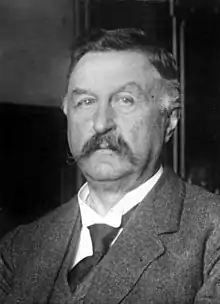 |
Constantin Fehrenbach (1852–1926) |
25 June 1920 |
4 May 1921 |
313 days | Centre Party | Fehrenbach | 1 (1920) | |
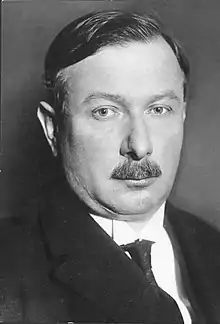 |
Joseph Wirth (1879–1956) |
10 May 1921 |
14 November 1922 |
1 year, 188 days | Centre Party | Wirth I | ||
| Wirth II | ||||||||
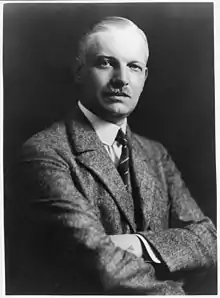 |
Wilhelm Cuno (1876–1933) |
22 November 1922 |
12 August 1923 |
263 days | Non-partisan | Cuno | ||
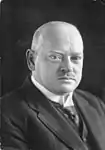 |
Gustav Stresemann (1878–1929) |
13 August 1923 |
30 November 1923 |
109 days | German People's Party | Stresemann I | ||
| Stresemann II | ||||||||
.jpg.webp) |
Wilhelm Marx (1863–1946) |
30 November 1923 |
15 January 1925 |
1 year, 46 days | Centre Party | Marx I | ||
| Marx II | 2 (May.1924) | |||||||
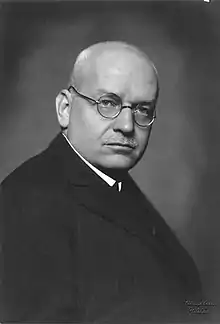 |
Hans Luther (1879–1962) |
15 January 1925 |
12 May 1926 |
1 year, 117 days | Non-partisan | Luther I | 3 (Dec.1924) | |
| Luther II | ||||||||
.jpg.webp) |
Wilhelm Marx (1863–1946) |
17 May 1926 |
12 June 1928 |
2 years, 26 days | Centre Party | Marx III | ||
| Marx IV | ||||||||
 |
Hermann Müller (1876–1931)[lower-alpha 2] |
28 June 1928 |
27 March 1930 |
1 year, 272 days | Social Democratic Party of Germany | Müller II | 4 (1928) | |
 |
Heinrich Brüning (1885–1970)[lower-alpha 3] |
30 March 1930 |
30 May 1932 |
2 years, 61 days | Centre Party | Brüning I | 5 (1930) | |
| Brüning II | ||||||||
 |
Franz von Papen (1879–1969)[lower-alpha 3] |
1 June 1932 |
17 November 1932 |
169 days | Non-partisan | Papen | 6 (Jul.1932) | |
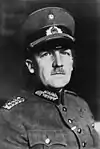 |
Kurt von Schleicher (1882–1934)[lower-alpha 3] |
3 December 1932 |
28 January 1933 |
56 days | Non-partisan | Schleicher | 7 (Nov.1932) | |
- The title of Chancellor was not formally used until the Weimar Constitution took effect. Instead Scheidemann and Bauer were appointed as Reichsministerpräsident (Minister-President or Prime Minister).
- Müller was the last parliamentary chancellor until Konrad Adenauer in 1949
- Non-parliamentary chancellor, appointed by Reichpraesident Paul von Hindenburg after no majority parliamentary coalition could be formed
Nazi Germany, Reichskanzler (1933–1945)
Adolf Hitler's Machtergreifung (seizure of power) marked the end of the Weimar Republic and the beginning of Nazi Germany. Hitler reigned as dictator and consolidated all power to himself.
Political parties
| Portrait | Name (Birth–Death) |
Term of office | Party | Cabinet | Reichstag[lower-alpha 1] | |||
|---|---|---|---|---|---|---|---|---|
| Took office | Left office | Duration | ||||||
 |
Adolf Hitler (1889–1945)[lower-alpha 2][lower-alpha 3] (Führer und Reichskanzler from 2 August 1934) |
30 January 1933 |
30 April 1945 |
12 years, 90 days | National Socialist German Workers' Party |
Hitler | 8 (Mar. 1933) | |
| 9 (Nov. 1933) | ||||||||
| 10 (Mar. 1936) | ||||||||
| 11 (Apr. 1938) | ||||||||
 |
Joseph Goebbels (1897–1945)[lower-alpha 3][lower-alpha 4] |
30 April 1945 |
1 May 1945 |
1 day | National Socialist German Workers' Party |
(Cabinet nominated in Hitler's testament but never convened) | — | |
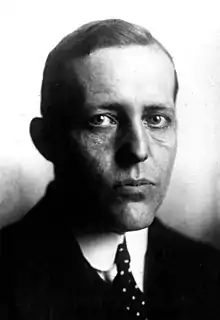 |
Lutz Graf Schwerin von Krosigk (1887–1977) (Leading Minister at Flensburg)[lower-alpha 5][lower-alpha 6] |
2 May 1945 |
23 May 1945 |
21 days | National Socialist German Workers' Party |
Schwerin von Krosigk | — | |
- No elections held during World War II. Last convened on 26 April 1942.
- Non-parliamentary chancellor, appointed by Reichpraesident Paul von Hindenburg after no majority parliamentary coalition could be formed
- Committed suicide in office.
- Appointed by Adolf Hitler in his Political Testament
- Appointed by Reichspräsident Karl Dönitz after the suicide of Goebbels
- Arrested; government dissolved.[7]
Federal Republic of Germany, Bundeskanzler (from 1949)
In 1949, two separate German states were established: the Federal Republic of Germany (known as West Germany) and the German Democratic Republic (known as East Germany). The list below gives the Chancellors of West Germany; the government of East Germany was headed by the Chairman of the Council of Ministers.[8] In 1990, East Germany was dissolved as it merged with West Germany; Germany was reunified. It retained the name of the Federal Republic of Germany.[9]
Political parties
| Portrait | Name (Birth–Death) |
Term of office | Party | Cabinet | Bundestag | |||
|---|---|---|---|---|---|---|---|---|
| Took office | Left office | Duration | ||||||
.jpg.webp) |
Konrad Adenauer (1876–1967) |
15 September 1949 |
20 October 1953 |
14 years, 30 days | Christian Democratic Union (CDU) |
Adenauer I CDU/CSU–FDP–DP |
1 (1949) | |
| 20 October 1953 |
29 October 1957 |
Adenauer II CDU/CSU–FDP/FVP–DP–GB/BHE |
2 (1953) | |||||
| 29 October 1957 |
14 November 1961 |
Adenauer III CDU/CSU–DP |
3 (1957) | |||||
| 14 November 1961 |
13 December 1962 |
Adenauer IV CDU/CSU–FDP |
4 (1961) | |||||
| 14 December 1962 |
15 October 1963 |
Adenauer V CDU/CSU–FDP | ||||||
 |
Ludwig Erhard (1897–1977) |
16 October 1963 |
26 October 1965 |
3 years, 45 days | No party membership;[10] affiliated with the Christian Democratic Union (CDU) |
Erhard I CDU/CSU–FDP | ||
| 26 October 1965 |
30 November 1966 |
Erhard II CDU/CSU–FDP |
5 (1965) | |||||
.jpg.webp) |
Kurt Georg Kiesinger (1904–1988) |
1 December 1966 |
21 October 1969 |
2 years, 324 days | Christian Democratic Union (CDU) |
Kiesinger CDU/CSU–SPD | ||
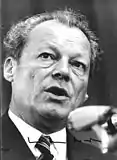 |
Willy Brandt (1913–1992) |
22 October 1969 |
15 December 1972 |
4 years, 197 days | Social Democratic Party of Germany (SPD) |
Brandt I SPD–FDP |
6 (1969) | |
| 15 December 1972 |
7 May 1974 |
Brandt II SPD–FDP |
7 (1972) | |||||
.jpg.webp) |
Walter Scheel (1919–2016) Acting Chancellor[lower-alpha 1] |
7 May 1974 |
16 May 1974 |
9 days | Free Democratic Party (FDP) |
(acting) | ||
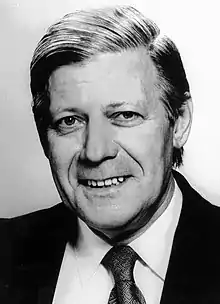 |
Helmut Schmidt (1918–2015) |
16 May 1974 |
14 December 1976 |
8 years, 138 days | Social Democratic Party of Germany (SPD) |
Schmidt I SPD–FDP | ||
| 16 December 1976 |
4 November 1980 |
Schmidt II SPD–FDP |
8 (1976) | |||||
| 6 November 1980 |
1 October 1982 |
Schmidt III SPD–FDP |
9 (1980) | |||||
 |
Helmut Kohl (1930–2017) |
1 October 1982 |
29 March 1983 |
16 years, 26 days | Christian Democratic Union (CDU) |
Kohl I CDU/CSU–FDP | ||
| 30 March 1983 |
11 March 1987 |
Kohl II CDU/CSU–FDP |
10 (1983) | |||||
| 12 March 1987 |
18 January 1991 |
Kohl III CDU/CSU–FDP |
11 (1987) | |||||
| 18 January 1991 |
17 November 1994 |
Kohl IV CDU/CSU–FDP |
12 (1990) | |||||
| 17 November 1994 |
27 October 1998 |
Kohl V CDU/CSU–FDP |
13 (1994) | |||||
.jpg.webp) |
Gerhard Schröder (1944–) |
27 October 1998 |
22 October 2002 |
7 years, 26 days | Social Democratic Party of Germany (SPD) |
Schröder I SPD–Green |
14 (1998) | |
| 22 October 2002 |
22 November 2005 |
Schröder II SPD–Green |
15 (2002) | |||||
 |
Angela Merkel (1954–) |
22 November 2005 |
28 October 2009 |
15 years, 80 days | Christian Democratic Union (CDU) |
Merkel I CDU/CSU–SPD |
16 (2005) | |
| 28 October 2009 |
17 December 2013 |
Merkel II CDU/CSU–FDP |
17 (2009) | |||||
| 17 December 2013 |
14 March 2018 |
Merkel III CDU/CSU–SPD |
18 (2013) | |||||
| 14 March 2018 |
Incumbent | Merkel IV CDU/CSU–SPD |
19 (2017) | |||||
- As Vice Chancellor under Brandt, Scheel served as acting Chancellor following Brandt's resignation.[11]
Timeline

See also
 |
|---|
| This article is part of a series on the politics and government of Germany |
|
|
| Wikimedia Commons has media related to Chancellors of Germany. |
- List of German monarchs
- List of German presidents
- Minister-Presidents of the French "Saar protectorate"
- Leadership of East Germany
- Vice-Chancellor of Germany#Lists of Vice Chancellors
- List of chancellors of Germany by age
- List of chancellors of Germany by time in office
- Religious affiliations of Chancellors of Germany
References
- "Neuland Grundgesetz | Abkehr von Weimarer Verfassung – Reaktion auf Nazi-Deutschland" [Virgin Soil "Basic Law" | Departure from Weimar Constitution - Reaction to Nazi Germany] (in German). Bundeszentrale für politische Bildung. 1 September 2008. Retrieved 13 March 2018.
- "Tasks of the Federal Chancellor". bundeskanzlerin.de. The Press and Information Office of the Federal Government. Retrieved 13 March 2018.
- [North German Constitution] (in German). 26 June 1867 – via Wikisource.
- [Verfassung des Deutschen Reichs]. 16 April 1871 – via Wikisource.
- "The Seeds of Evil: The Rise of Hitler — The Constitution of the Weimar Republic". schoolshistory.org.uk. 2004. Archived from the original on 20 August 2011. Retrieved 13 March 2018.
- "Biografie Friedrich Ebert 1871-1925" [Biography of Friedrich Ebert]. www.dhm.de/lemo (in German). LeMO/Deutsches Historisches Museum. Retrieved 14 March 2018.
- Hillmann, Jörg; Zimmermann, John (2014) [2002]. "Die »Reichsregierung« in Flensburg" [The "Government" in Flensburg]. Kriegsende 1945 in Deutschland (in German). Munich: Walter de Gruyter GmbH & Co KG. pp. 35–65. ISBN 978-3-486-83332-4.
- "Entstehung der DDR: Verfassung und Führungsrolle der SED" [Formation of the GDR: Constitution and the SED's Leadership Role]. www.hdg.de/lemo (in German). LeMO/Haus der Geschichte. Retrieved 14 March 2018.
- "Vertrag zwischen der Bundesrepublik Deutschland und der Deutschen Demokratischen Republik über die Herstellung der Einheit Deutschlands (Einigungsvertrag)" [Unification Treaty between the Federal Republic of Germany and the German Democratic Republic]. Treaty of 31 August 1990 (in German). Retrieved 13 March 2018.
- Jörges, Hans Ulrich; Wüllenweber, Walter (25 April 2007). "CDU-Altkanzler: Ludwig Erhard war nie CDU-Mitglied" (in German). Der Stern. Retrieved 8 April 2018.
- McFadden, Robert D. (24 August 2016). "Walter Scheel, Leading Figure in West German Thaw With the East, Dies at 97". The New York Times. Retrieved 14 March 2018.

